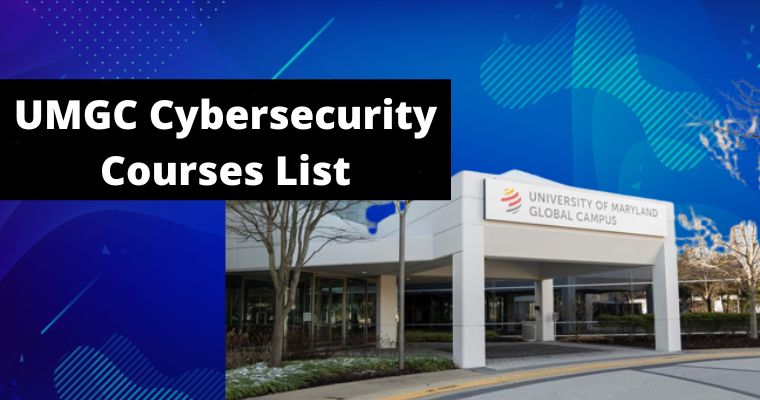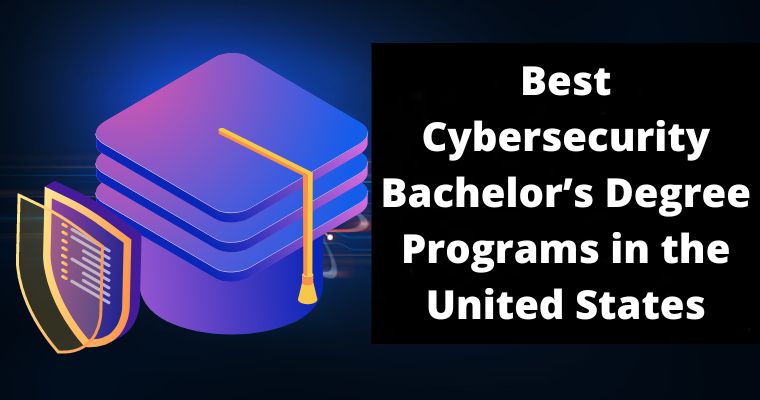The rapidly developing field of cybersecurity provides a plethora of job possibilities. The bachelor’s, master’s, and certificate programs in cybersecurity at the University of Maryland Global Campus (UMGC) are intended to assist you in acquiring the technical skills, knowledge, and expertise needed to reach your full potential and specialize in the cybersecurity field of your choosing.
You’ll get technical certifications and training to help you land your ideal job by learning from industry experts. To assist you in achieving your professional goals, they will provide you with lifetime access to career services and resources.
Table of Contents
What Are the Benefits of Studying Cybersecurity at UMGC?
At the University of Maryland Global Campus (UMGC), cybersecurity is at the forefront of their curriculum, and not an afterthought. You get to choose from a variety of cybersecurity bachelor’s and master’s degrees, and certificate courses too in areas such as digital forensics and cyber policy.
- Where the openings are: Maryland’s cybersecurity network includes 12 major military bases, 400 government, academic, and commercial research facilities, and about 50 federal agencies.
- At the heart of cybersecurity: The UMGC is located in Virginia, between the Cyber Command of the Department of Defense and the Cyber Corridor.
- University of Maryland’s cybersecurity program is constantly updated and developed with input from prominent employers and cybersecurity professionals.
- Taught by professors who are rock stars in the field: Nearly, all UMGC cybersecurity faculty members are authorities in the sector, allowing you direct access to industry leaders.
- The University of Maryland – Global Campus (UMGC) was created to cater to the requirements of working adults. Take online courses knowing that your education is backed by the reputation of a state-funded institution.
- Realtime, hands-on experience: UMGC’s virtual cybersecurity lab allows students to attack and defend online in a secure and safe atmosphere.
- A team of world-class cybersecurity experts: The Cyber Competition Team from the University of Maryland, Baltimore County gives students hands-on experience and networking possibilities.
Find the Best Cybersecurity Degree Program For You
You may compare as many as three degrees, specializations, and certificates side by side with UMGC’s Program Comparison Tool.
Not only that, but also you have the leverage to read program descriptions, costs, transfer credits, program structures, course topics, and more.
Have you found the program you’re looking for? Our Time and Tuition Estimator can give you an idea of how much it will cost to complete your degree education.
Different CyberSecurity degrees/certificate courses available at the University of Maryland Global Campus (UMGC)-
(1) Bachelor’s Degrees:
What is a Bachelor’s Degree in cybersecurity?
Graduates will acquire the necessary skills to operate in the field of information and communication technologies and services, as well as to provide support for information security.
In addition to the basic competencies of computer sciences, graduates will master a wide range of information and communication technologies.
The degree will prepare students for various positions in companies providing services related to information and communication technology, as well as a wide range of positions in private and public organizations.
Graduates will also acquire knowledge in the following areas:
- Operating Systems.
- Computer Networks.
- Cryptography and network security.
- Information security planning and management.
- Security of e-business systems and services.
- Computer forensics
- information security planning and management.
1st and 2nd year.
The new undergrad students will acquire the knowledge and skills needed to assess the security of information systems, identify risks and adopt appropriate measures to control them.
They will also be able to plan, implement and control effective security measures in the organization.
Students will get live hands-on experience in the areas of information security in companies operating in different areas, including in banking and finance, e-commerce, business process outsourcing, investments, etc.
3rd or final year.
Course attendees will be able to detect the technologies that are needed in electronic security within organizations, set up security infrastructure, and ensure their operation.
Cryptography and security protocols will be taught to the students so that they will be able to design secure systems that ensure confidentiality, integrity, and availability of information.
They get the best teachings from the most experienced faculty to get the required skills to detect and prevent information fraud and cybercrimes. They will be able to recognize electronic crimes and participate in criminal investigation and prosecution.
What could you do with a Bachelor’s Degree in cybersecurity?
Many people think cybersecurity is merely a technical IT job. However, the need for cybersecurity professionals spans all types of organizations from government agencies to financial institutions which is why it’s becoming a hot topic.
A cybersecurity degree will arm you with knowledge and training to help protect organizations from cyber-attacks.
There is no shortage of jobs out there, but we explore what you could do with a Bachelor’s Degree in cybersecurity. (Article Source: Cybersecurity Ventures)
Under the Bachelor’s Degree umbrella offered by UMGC, you have the leverage to choose from-
- Computer Networks and Cybersecurity
- Cybersecurity Management and Policy
- Software Development and Security
Cybersecurity Graduate Certificate by UMGC-
The graduate certificate in cybersecurity is typically a program that students can take as an addition to their undergraduate degree if they want to better their chances of getting jobs and advancing their careers.
Individuals who already possess a bachelor’s degree but do not have any experience with computers or technology could benefit from obtaining a certificate in bachelor’s degree in cyber security.
(2) Master’s Degree
What is a Master’s Degree in Cybersecurity?
Cybersecurity is a term that is used to describe the protection of computers, devices, programs, and data from unauthorized access. It also involves protecting these items from damage, deletion, or disruption.
The Master’s Degree in Cybersecurity is designed for students who already have a Bachelor of Science degree but are interested in advancing their career by getting some more education on the subject.
This degree will help individuals gain an edge over other applicants when seeking jobs at companies that deal with protecting data or computers.
Since there are many different online options to choose from, it is important to understand what the requirements are and how they may differ from one school to another.
What will you learn from Cybersecurity Master’s Degree?
Students who are pursuing this degree will be able to gain an in-depth understanding of how network systems work, what they do when someone breaks into them, and the different components that make up these networks.
The courses in this program will focus on subjects like information protection, risk management, data security, and forensics.
These types of Masters in Cybersecurity can help students develop the skills and knowledge they need to be able to work as a security engineers, information technology directors, or a software developers for companies that deal with computer security.
In addition to learning about how these systems work, students enrolled in this program will also take classes on teaching them how to properly protect those systems from attacks.
Students may also be able to focus more heavily on one of the following areas:
Academic requirements
Before enrolling in a UMGC’s Master’s Degree in Cybersecurity, it is important for prospective students to meet some academic requirements.
These programs tend to require applicants have earned at least a bachelor’s degree from an accredited college or university.
Some programs accept individuals who have earned their master’s degree in Computer Science, although this is not required.
Prospective students should make certain the programs they are considering accept transfer credits from other institutions for courses that have been taken during previous years.
What could you do with a Master’s Degree in Cybersecurity?
With a master’s degree in cybersecurity, students can explore jobs that involve protecting individuals’ data and devices from being hacked into or damaged by malware or viruses.
They could work at companies that develop software to protect these items as well as steal data on them such as bank records and credit card numbers.
It is also possible for those who earn this type of degree to work as consultants who assess the risk of someone hacking into a company’s network and then offer ways to mitigate that risk.
Some students who earn this degree may also choose to enroll in additional courses to become certified information security professionals.
A Master’s Degree in Cybersecurity can also be beneficial for people who want to advance their careers by becoming an IT director or software developer at companies that deal with securing computer networks.
It is essential for anyone hoping to work in these positions to possess the skills needed to ensure the security of the company’s data and systems against outside threats.
They must also understand how malware, viruses, and other forms of attack enter a system so they know how to stop them before they cause any damage or harm to individuals’ sensitive information stored on those systems.
Under the Master’s Degree umbrella offered by UMGC, you have the leverage to choose from-
- Cloud Computing Architecture
- Cyber Operations
- CyberAccounting
- Cybersecurity Management and Policy
- Cybersecurity Technology
- Digital Forensics and Cyber Investigation
- Information Technology: Information Assurance
(3) Online Cyber security certificates
What will you learn in certificate courses in cybersecurity?
There are so many career paths you can take in Information Technology. But if you want to be a cybersecurity professional, then certification courses are the best option.
There are many online certificate courses in cybersecurity that can help you learn the basics of different fields like intrusion detection and prevention, database security, configuration management, etc.
If you’re looking for certificate courses in cybersecurity, then this detailed guide will help you make an informed decision about your career.
UMGC Undergraduate Certificate Program
- Computer Networking
UMGC Graduate Certificate Program List
- Cloud Computing and Networking
- Cyber Operations
- Cybersecurity Management and Policy
- Cybersecurity Technology
- Digital Forensics and Cyber Investigation
- Information Assurance
The Cybersecurity Certificate Career Path
A cybersecurity professional can get a job in many different roles, including:
System Administrator – People in this role are responsible for maintaining servers and workstations across an organization. They make sure that all software is up-to-date, fix errors when they appear, etc.
The salary ranges from 40K to 65K per year, but the demand for IT administrators is very high right now. This means that you can get a great pay raise by changing companies or switching jobs within your company.
To get into this role, you need 3 years of experience working as an administrator in the industry. Unfortunately, there aren’t any certificate courses in information technology administration.
So if you’re doing an online certificate course in cybersecurity right now, then it’s best to focus on other areas.
People in this role are responsible for maintaining servers and workstations across an organization. They make sure that all software is up-to-date, fix errors when they appear, etc.
Security Analyst – This is one of the most popular roles available for cybersecurity professionals.
People who are responsible for this role need to identify security threats within an organization and work with the cybersecurity team to develop strategies for dealing with them.
To get into this role, you need at least 3 years of experience as a technical specialist or administrative assistant in the industry.
However, you can do some certificate courses in cybersecurity management or computer science first before applying for this job if you want to improve your chances of being hired by top companies.
This is one of the most popular roles available for cybersecurity professionals. People in this role are responsible for identifying security threats within an organization and working with business leaders to develop strategies for dealing with them.
Security Architect – People in this role are responsible for designing and implementing information security strategies and program within an organization.
This means that they design various protection systems like firewalls and intrusion detection systems etc., and also implement them across different departments within the company.
To be successful in this role, it’s best to have 5+ years of work experience in network engineering or system administration.
There aren’t any online certificate courses that can help you get into this role, but the good news is that there are many training programs available that can prepare you for it.
Penetration Tester – One of the most challenging jobs available for cybersecurity professionals.
People in this role are responsible for testing the security of an organization’s digital systems.
Also, you should have a deep understanding of networking protocols and operating systems.
It would be very hard to get into this job by just doing certificate courses online, but if you already have a background in system administration then there are many training programs that can prepare you for a career in penetration testing.
Under the Cybersecurity certificate courses umbrella offered by UMGC, you have the leverage to choose from-
–




